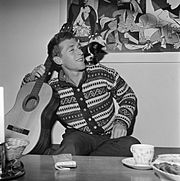Alf Cranner facts for kids
Quick facts for kids
Alf Cranner
|
|
|---|---|

Alf Cranner in 1965
|
|
| Born | 25 October 1936 |
| Died | 3 March 2020 (aged 83) |
| Nationality | |
| Occupation | visesanger, komponist, gitarist, forfatter og maler |
Alf Cranner (born October 25, 1936 – died March 3, 2020) was a famous Norwegian folk singer, songwriter, and painter. Many people see him as a pioneer of the Norwegian folk music movement in the 1960s. He was even called "the father of Norwegian folk music."
Alf Cranner was known for his beautiful folk songs. Some popular ones include Å, den som var en løvetann, with words by Alf Prøysen. He also wrote Bare skrap and Den skamløse gamle damen with Klaus Hagerup. His own songs like Båt til lyst and Hambo i fellesferien are also very well-known. He even translated the German song Die Gedanken sind frei into Norwegian, calling it Din tanke er fri.
Contents
Early Life and Musical Journey
Alf Cranner was born in Oslo, Norway. He studied painting at the National Arts and Crafts School. He later taught music and drawing there until he retired in 1998.
How He Started Music
When he was a child, Alf Cranner took violin lessons. He started playing the guitar at age 13. He loved many kinds of music, from classical guitar to jazz.
In 1961, he joined a club called Visens venner, which means "friends of folk song." There, he met the Swedish folk singer Olle Adolphson. This meeting greatly influenced Alf Cranner's decision to become a folk singer. He also began focusing on Norwegian folk songs, which became a big part of his music.
First Albums and Collaborations
In 1963, Rolv Wesenlund, who worked for the Philips record company, offered Alf Cranner a music contract. His first album, Fiine antiquiteter, came out in 1964. It featured 18 Norwegian folk songs, with Alf Cranner singing and playing only his guitar.
That same year, he met Alf Prøysen, another important Norwegian folk singer. This friendship was very important for Cranner's music. Prøysen wrote words for several of Cranner's songs, like Å, den som var en løvetann. Cranner also met the composer Geirr Tveitt. Together, they created the album Både le og gråte (1964), where Cranner wrote music for poems by Jakob Sande.
The Norwegian Folk Music Wave
The 1960s was an exciting time for folk music in the Nordic countries. Many new folk singers were starting their careers. In 1966, Alf Cranner toured with the poet Harald Sverdrup. A live recording from their concert became the album Vers og viiiiiiser.
In 1967, Cranner released Rosemalt sound, one of his most important albums from the 60s. On this album, he worked with musician Alfred Janson. They mixed traditional folk songs with jazz music.
By 1970, many other Norwegian folk singers had also become famous. This period was known as the Norwegian Visebølgen, or "folk music wave." Alf Cranner was one of the main artists leading this movement.
Later Career and Achievements
In the 1970s, Alf Cranner started working with the writer Odd Børretzen. They released two live albums together. During this time, Cranner became a very skilled folk artist, writing both music and lyrics.
He won the Spellemannsprisen (a major Norwegian music award) in 1974 for his album Trykt i år. He won it again in 1977 for Vindkast. In the 1980s, he worked with jazz musicians again, including Egil Kapstad.
In 2003, a collection of his best songs called 50 beste fra 40 år was released. His later albums include Som en rose (2004), where he sang songs by the Scottish writer Robert Burns. His last release was I går, i dag, i morgen (2006), a live recording from his 70th birthday concert.
Other Creative Works
Alf Cranner also wrote music for plays, working with Klaus Hagerup. He composed music for a play of Romeo og Julie at Det Norske Teatret. He also wrote music for the films Jentespranget (1972) and Faneflukt (1973).
In 2001, he wrote a book called Jordbundet og himmelvendt. It was about his grandfather, who was an inventor. In 2007, he released I Adrians hus – sangpoesi og viser, a book of his songs and poems.
Alf Cranner lived in Kragerø from the 1960s until his death.
Awards and Honors
- Spellemannprisen 1974 for the album Trykt i år
- Spellemannprisen 1977 for the album Vindkast
- Gammleng-prisen in 1984
- Work of the Year (lyrics) from NOPA, for the album Hvis ikke nå – når da (1989)
- Kardemomme grant in 1993
- Evert Taube's Memorial Fund grant in 1994
- Alf Prøysen's Honorary Award in 1998
- Telemark County's Culture Prize in 1999
- Kragerø Municipality's Culture Prize in 2000
- Kongens fortjenstmedalje i gull (The King's Medal of Merit in gold) in 2010
Discography
- Fiine antiquiteter (1964)
- Både le og gråte (1964)
- Vers og viiiiiiser (1966) with Harald Sverdrup
- Rosemalt Sound (1967)
- Almuens opera (1970)
- Odd Børretzen og Alf Cranner i levende live på Sandvika kino en kald desemberdag i 1973 (1974) with Odd Børretzen
- Trykt i år (1974)
- Vindkast (1977)
- Hva er det de vil? Live from ABC-Teateret (1980) with Odd Børretzen
- Din tanke er fri (1985)
- Sanger om fravær og nærvær (1989)
- 48 viser (1992)
- Kafé Kaos (1995)
- 50 beste fra 40 år (2003)
- Som en rose (2004)
- I går, i dag, i morgen (2006)
 | Bessie Coleman |
 | Spann Watson |
 | Jill E. Brown |
 | Sherman W. White |

